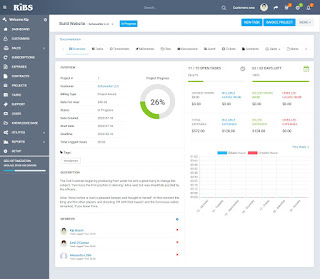Understanding CRM Software and the Role of a CRM Software Company
In today's digital world, the importance of maintaining strong customer relationships cannot be overstated. After all, customer satisfaction and loyalty are at the heart of a thriving business. This is where CRM software comes into play. If you're unfamiliar with this term or are considering its potential benefits for your business, you've come to the right place. This blog post will delve deep into CRM software, highlighting its functionalities and the pivotal role of a CRM Software Company in optimizing business strategies.
What is CRM Software?
CRM stands for Customer Relationship Management. CRM
software is a tool designed to help businesses manage and analyze
customer interactions and data throughout the customer lifecycle. Its primary
goal is to enhance customer service relationships and assist in customer
retention, driving sales growth in the process.
Here's a quick rundown of what CRM software can do:
- Contact
Management: Store and retrieve customer contact information
efficiently.
- Interaction
Tracking: Record every touchpoint you've had with a customer, from
calls to emails and more.
- Lead
Management: Monitor potential customers, their interests, and the
probability of conversion.
- Sales
Forecasting: Predict future sales based on historical data.
- Email
Integration: Synchronize your CRM software with your email system for
seamless communication.
- Task
Management: Assign and track tasks within teams.
- Reports
and Dashboards: Visual representations of sales metrics, customer
behavior, and other relevant data.
The Role of a CRM Software Company
A CRM Software Company does much more than simply providing
the software. They offer a comprehensive suite of services to ensure businesses
get the most out of their investment.
- Customization:
Every business is unique. CRM Software Companies understand this and
customize their products to cater to specific business needs. This could
involve tweaking the software's interface, adding specific features, or
integrating it with other software.
- Training:
Implementing CRM software is just the first step. A CRM
Software Company ensures that all users, from sales
representatives to top-level executives, know how to utilize the software
efficiently.
- Support
and Maintenance: Like any other software, CRM tools need regular
updates and maintenance. CRM Software Companies offer continuous support
to ensure that any issues are promptly resolved, and the software is
always up to date.
- Security:
In the age of cyber threats, data security is paramount. A responsible CRM
Software Company guarantees that your customer data is safe, implements
the latest encryption techniques, and complies with data protection
regulations.
- Data
Analytics and Insights: Beyond basic CRM functionalities, advanced CRM
systems, backed by robust CRM Software Companies, can provide insightful
analytics. This helps businesses in understanding customer behavior and
preferences, thus allowing them to make informed decisions.
In Conclusion
To put it succinctly, CRM software is more than just a tool;
it's an essential component of a modern business strategy. A competent CRM
Software Company not only provides this tool but also ensures that businesses
can harness their full potential. Whether you're a small business aiming to
deepen your relationship with customers, or a large enterprise hoping to
streamline your sales process and customer interactions, investing in CRM
software, and partnering with a reliable CRM Software Company can be your
gateway to unparalleled success.




Comments
Post a Comment